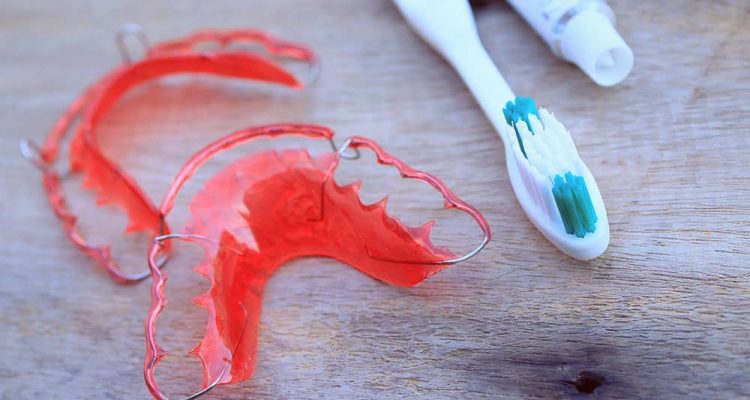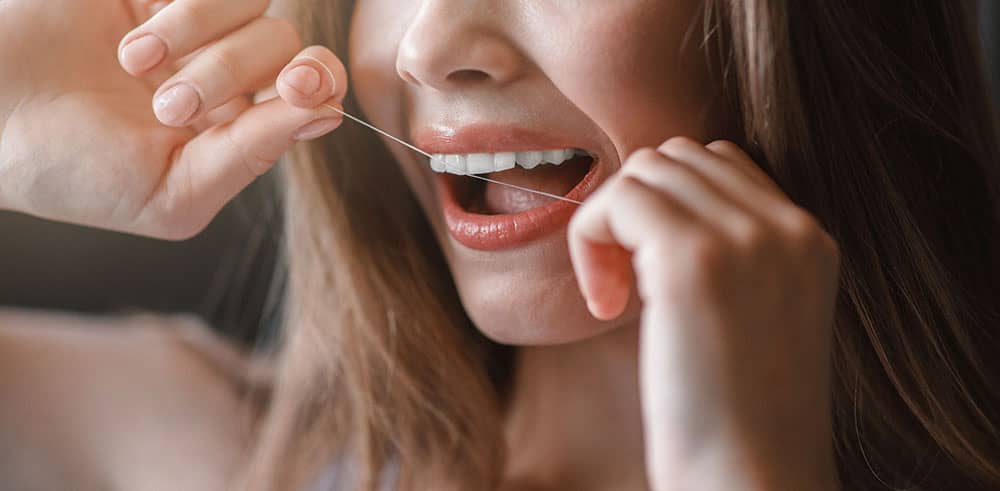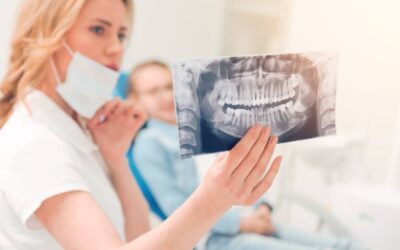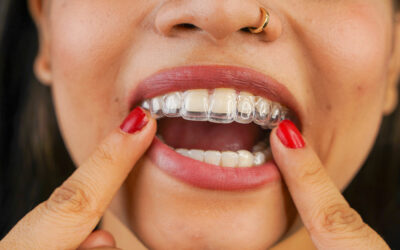If you find yourself isolating at home during COVID-19, we gathered some tips for caring for your dental implants, dentures, retainers, and dental bridges at home. We’ll also cover what to do if you experience certain oral health issues during this time.
How to Care for Dental Implants at Home
Dental implants do not require much maintenance, but they do need to be cleaned and cared for consistently. Home dental care, good oral hygiene, and regularly cleaning your dental implants helps decrease the risk of infections and prolong the lifespan of the dental implants.
Without proper and consistent cleaning, plaque can build up around dental implants and cause an infection called peri-implantitis. As with gum disease, peri-implantitis puts surrounding teeth at risk of damage and may lead to bone loss in the jaw.
To lower your risk of dental implant infections, dentists recommend:
- Flossing regularly (at least once to twice a day), including between the implant and the surrounding teeth
- Cutting down on your sugar intake (sugar feeds bad bacteria and can increase the build-up of plaque)
- Brushing your teeth, including around your dental implant, at least twice a day with a soft toothbrush and fluoride toothpaste in gentle, circular motions
- Avoid chewing on non-food objects such as ice, fingernails, or pens
- Attend routine dental checkups
When to Call Your Dentist About Dental Implant Concerns
Even with proper care, problems with dental implants do occasionally arise. These issues require professional evaluation by your dentist to ensure the problems do not turn serious.
Contact your dentist immediately if you experience any of the following symptoms with your dental implants:
- Redness or sore gums around the implant
- The dental implant or crown feeling loose or shifting slightly
- Difficulty chewing
- Swelling around the implant
- Numbness, tingling, or pain around the implant
- Signs of infection
- Gum inflammation
- Gum recession
- Severe pain or discomfort
As with many dental issues, seeking immediate treatment for dental implant complications is key to preventing serious side effects. If you are experiencing discomfort or signs of infection, contact your dentist immediately for guidance.
How to Care for a Dental Bridge at Home
Dental bridges are generally easy to care for by following your regular oral hygiene routine. Additional tips for preventing problems with your dental bridge include:
- Do not chew on or bite non-food objects such as pencils, pens, fingernails, or ice cubes
- Avoid sticky or very hard foods
- Floss your teeth at least once a day
- Brush your teeth twice a day, using gentle circular motions and a fluoride toothpaste
- Brush the dental bridge using a denture cleaner instead of toothpaste (abrasive cleaners can scratch the bridge’s surface)
- Use cool or warm water when rinsing your mouth (hot water can cause the dental bridge to warp)
- See your dentist for regular checkups
Common dental bridge issues include:
- The bridge falling out or feeling loose
- Chips or cracks in the artificial teeth
- Tooth decay
- A toothache or sensitivity around the bridge
If you are experiencing issues or worried about your dental bridge, be sure to contact your dentist.
How to Care for Your Dentures at Home
If you care for your dentures the same as you would care for natural teeth, this helps prevent oral health problems such as gum disease and other issues such as bad breath.
To care for your dentures, it is recommended to:
- Use a cleaning solution specifically designed for dentures at least once a week
- Remove your dentures before going to sleep, unless your dentist advises you otherwise
- See your dentist for regular checkups
- Store your dentures away from heat sources or direct sunlight
- Handle dentures carefully when putting them in or removing them
- Store dentures away from pets
- Clean your dentures daily using warm water, liquid soap, and a toothbrush
- Brush any remaining teeth and your gums twice a day with a soft toothbrush and fluoride toothpaste (always use gentle, circular motions)
Common denture problems include:
- Feeling loose
- Damage to the dentures
- Feeling uncomfortable or painful
- Ulcers
- Difficulty chewing
Although it is normal for dentures to feel uncomfortable when you first get them, this discomfort should fade as you adjust to them. Staying consistent with your oral hygiene can help reduce inflammation that leads to sensitivity and pain.
If your dentures are damaged or causing you discomfort, please contact your dentist immediately. Normal wear and tear or changes in the jaw can cause dentures to become loose or ill-fitting with time, making it important to see your dentist regularly for checkups. Your dentist can ensure your dentures are in good working condition and still fitting properly in your mouth.
How to Care for Retainers at Home
Wearing a retainer is a key part of successful orthodontic treatment. A retainer will prevent your teeth from becoming crooked or moving back to their original position.
It is crucial to follow your orthodontist’s or dentist’s instructions regarding how long to wear your retainer. The length of time you’ll be required to wear a retainer depends on a variety of factors.
It is important to maintain your retainer with proper hygiene to prevent oral health problems. Here are some tips to look after your retainer:
- If your retainer is fixed, brush and floss your teeth as normal, especially around your retainer (ask your dentist if you experience trouble flossing properly around a fixed retainer)
- If your retainer is removable, wash it with a cleaner specifically designed for retainers or with cold water and liquid soap.
- Always store your retainer properly in a secure container and away from pets (dogs love to chew up retainers!)
- If you lose your retainer, contact your orthodontist or dentist immediately for a replacement.
How to Care for Veneers at Home
Caring for your veneers helps them last as long as possible and prevents oral health complications. To maintain your veneers, it is vital that you care for them properly by:
- Avoiding teeth grinding or clenching
- Brushing and flossing daily
- Avoiding hard, sticky, or chewing foods
- Wearing a mouthguard for contact sports
- Attending regular dental checkups
- Avoiding habits that harm teeth (undoing knots with your teeth, opening packages with your teeth, biting your nails, chewing on non-food objects, etc.)
If you are experiencing veneer problems, contact your dental professional immediately.
How to Deal with Common Orthodontic Problems
If you are experiencing orthodontic problems, it is key to take the proper steps to minimise the issue until you can be evaluated by your dentist or orthodontist.
If you are experiencing problems with your retainers, orthodontic appliance, dental bridge, dentures, or braces, here are the steps to take until you can see your dentist:
- Broken Retainer — It only takes a day or two for teeth to start shifting if you stop wearing a retainer. If your retainer is broken, contact your dentist immediately to schedule a replacement fitting. If your fixed retainer is broken, wear a removable retainer, if possible, until you can receive treatment.
- Loose Brace Wire — If you notice a wire from your braces poking your mouth, contact your orthodontist or dentist immediately to avoid the risk of infection or injury. In the meantime, you may try using tweezers to bend the wire or using orthodontic wax to cover the wire’s end (in this case, you can even use sugar-free gum as an alternative to dental wax)
If you are experiencing dental issues, contact your dental professional immediately for advice on what to do until you can be treated. For more information on what to do until you can see a dentist, read our guide on What Qualifies as a Dental Emergency.
123 Dental Is Here For You
The safety and wellness of our staff, patients, and community is our top priority and we hope to do everything we can to make it easy for you to keep your oral health in top condition.
If you have questions about caring for your teeth at home, are experiencing issues, or need advice, please know that we are only a phone call away. Our caring team would be glad to walk you through any problems you are experiencing or get you an appointment if needed.








